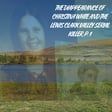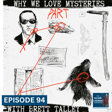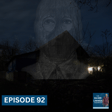Admiration for the American Justice System
00:00:00
Speaker
Well, I think particularly those wanting to go into the criminal justice system, whether it's a defense attorney or as a prosecutor, we have again, and i'm I love this country and I love our justice system because as I said earlier, we have the best, I think the best justice system in the world. It's not perfect, but I think it's the best.
Motivations for Attending Law School
00:00:22
Speaker
And people who are thinking about going to law school need to think about the reasons why they're doing it. Some people say, because I want to make a lot of money. Okay, great. that's you know We all want to make a lot of money, right? But really, is it in your heart? Is it in your gut? i mean Do you love? Are you going to love what you do? My daughter, for example, wants to go to law school. She's
00:00:44
Speaker
actually studying for the LSAT now. and you know What I tell her is, make sure that it is a passion, it's a fire that's burning in your stomach. and you know The money, the financial part of it, hey, that's great if you're able to achieve that financial success.
Fidelity to Justice in Prosecution
00:01:01
Speaker
The important thing is loving what you do. and If you go into, for example, prosecution,
00:01:07
Speaker
Make sure you are the best prosecutor you can be i know a lot of prosecutors i litigated against one out the fence attorneys and you know we do cases together. And so yes you can get a lot of back and forth but the most important thing is your fidelity to justice and your fidelity to. She doing the right thing and if you're a prosecutor as i mentioned earlier,
00:01:31
Speaker
being completely transparent, being completely honest. And sometimes that means, you know, not winning a case.
Erlinda Ocampo Johnson and the Baldwin Trial
00:01:42
Speaker
That's Erlinda Ocampo Johnson, the attorney serving as a prosecutor who resigned from the Alec Baldwin trial over ethical concerns. This is the Silver Linings Handbook podcast. I'm Jason Blair.
00:02:12
Speaker
Berlinda Ocampo-Johnson is an attorney based in Albuquerque, New Mexico, who took a special appointment to serve as the prosecutor on the Alec Baldwin trial. Berlinda resigned in the middle of the trial against Baldwin, the actor who was being tried on involuntary manslaughter charges.
00:02:30
Speaker
The charges stemmed from an incident on the set of the movie Rust, where Baldwin was an executive producer and an actor. In that incident, while rehearsing inside a church set on a ranch outside Santa Fe, a gun that Baldwin was holding discharged, killing the film's director of photography, Helena Hutchins, and wounding its director, Joel Souza.
00:02:55
Speaker
Johnson opened the trial by telling jurors that Baldwin was reckless in pointing his gun at people, putting his finger on the trigger when he was not supposed to, and violating multiple gun safety rules that ultimately led to the death of Hutchins.
00:03:11
Speaker
The defense argued in their opening statement that Baldwin had committed no crime, that as an actor he was not required to check the gun because he relied on professionals to ensure it was safe, including that it was not loaded with a live round.
00:03:27
Speaker
The set's property key assistant and armorer, Hannah Guterres Reed, who was responsible for checking the weapon, was convicted of one count of involuntary manslaughter and sentenced to 18 months in prison prior to the Baldwin trial beginning.
00:03:43
Speaker
David Halls, who handed the weapon to Baldwin, pleaded no contest to a charge of negligent use of a deadly weapon for saying it was a cold gun before giving it to the actor. Halls was sentenced to six months of probation. The case against Baldwin started and stopped in fits and starts before it finally went to trial in July, 2024.
00:04:07
Speaker
Two days after the jurors were sworn in and the legal concept of jeopardy attached, Baldwin's defense attorneys filed a motion to dismiss the case over allegations that prosecutors hid evidence regarding the source of the bullets loaded into the gun.
00:04:24
Speaker
A set of bullets had been submitted to authorities with a witness claiming the bullets were related to the Rust case, but the evidence was filed under a different case number and the defense was not informed of the existence of the evidence. When Kara Morrissey, the lead prosecutor in the case, made the decision to fight the motion to dismiss, Orlinda says she resigned and refused to move forward with the case because she felt the charges should have been dismissed at that point.
00:04:54
Speaker
Which, because of that doctrine of double jeopardy, would have likely meant Baldwin could not be retried. Morrissey argued that the disputed ammunition was not linked to the case or hidden from Baldwin's lawyers, saying there was no evidence that it was related to Rust.
00:05:11
Speaker
Judge Mary Silmer agreed with Erlinda the next day dismissing the case with prejudice, which meant Baldwin could not be retrothed.
Erlinda's Career and Background
00:05:20
Speaker
The judge also said there were no steps she could take to cure the fundamental unfairness of the evidence being withheld. Erlinda still says she believes in the case against Baldwin, but the right thing to do was to drop the charges.
00:05:35
Speaker
Orlinda's choice, she has said, was informed by her belief that a prosecutor's duty is to justice, not to winning. In her own experience being born in Nicaragua, a country whose judicial system, human rights organizations say, has been co-opted and led to unfair trials of people merely because they were considered critical of the government, also informed her decision.
00:06:02
Speaker
Erlinda's family sought asylum in the United States during the height of the Nicaraguan Civil War in 1979. Eventually her family settled down in Santa Fe where she pursued her dream of success. She graduated from the University of New Mexico with a bachelor's degree in economics in 1992 and then the University of New Mexico School of Law in 1995.
00:06:27
Speaker
She served as an assistant district attorney in Santa Fe, an assistant United States attorney for the District of New Mexico, an instructor for the U.S. Department of Justice who trained law enforcement and prosecutors across Latin America. And now she has her own private practice, which she started in 2006 and still runs today.
00:06:48
Speaker
Today, we're going to talk about the role of lawyers in the legal system, the obligations of prosecutors to justice as opposed to winning, and how coming to the United States as an em immigrant from a country with a very different justice system informs the way that Orlinda looks at the law, the legal system, and what the role of attorneys are in preserving.
00:07:29
Speaker
So, Erlinda, I wanted to just thank you for joining me. um As I had mentioned before, I first ah came across you when you were being interviewed on the Prosecutors podcast with Brett Nallis, and I was just really, I think I was impressed. I was very interested in your background and your story, but I was really press impressed by the idea that in this day and age,
00:07:55
Speaker
um There are so many, there's so few instances where people are demonstrating the level of courage um I think that it takes to walk away in a moment like that. And I was just really impressed. And I thought it was just a great example for all of us. you know They're inevitably probably good and bad consequences to all the decisions that we make, but I thought it took took a lot of courage and I was impressed by that.
00:08:22
Speaker
so thank Thank you, Jason. I appreciate you
Ethical Obligations in Prosecution
00:08:25
Speaker
having me on. Thank you very much. And um yeah, it was not an easy decision because obviously and I had to do it without consulting anybody, without really taking the time to reflect to me. It just seemed like the right thing to do at the time.
00:08:44
Speaker
Yeah, because you had in that situation as a special prosecutor, it's not like you had an ethics officer like you might at the Department of Justice to go talk to or I'm guessing long established policies that that protect people. how i Can I ask you, how did you make the decision in the moment? Did you did you did it take time for you or was it something? ah how did that How did that decision just come about for you? You know, it developed throughout the morning um after I learned. um So it it started Thursday afternoon on July 11th with the Lead Defense Council cross-examining the crime scene technician and then learning um that evening
00:09:29
Speaker
what these rounds um were about and um where they came from. and And I was told they have nothing to do. They don't look anything like the ones from the set of rust. So that evening I thought, okay, this is possibly just a distraction. Then on Friday morning on July 12th, when the judge ordered that the rounds be removed from the evidence bag and three of them were identical to the ones from the set of rust,
00:09:55
Speaker
I thought, oh no, wait a minute. This is a problem because we as prosecutors don't get to decide what the defense is going to be. We may say, and this is a problem I think throughout the United States where prosecutors are deciding what is material to the defense and what is not. Because the individuals who are tasked with deciding what is Brady are the prosecutors.
00:10:22
Speaker
And I think there needs to be a restructuring and a revamping of that law because I don't think you should be left up to prosecutors to make that decision. But for me, when I saw that and I started doing some research and we're in the middle of trial, I thought, wait a minute, I think that I could see how the defense, so I put on my defense attorney hat and I thought, oh,
00:10:46
Speaker
I could see how the defense would use these rounds and would use this evidence in their defense. I could see how then they are material, um that there was sabotage on the set, that it was not Hannah Gutierrez Reed who was negligent, it was some other individual. Whether that would have worked, probably not. and her But in your least an avenue that you thought they should have at least had that evidence to be able to even pursue that. Exactly. So that, that was not the issue. I don't think prosecutors, and I think that was the mistake, uh, the lead special prosecutor made was deciding what, well, there's some material that's not relevant. It doesn't matter. You disclose it. And so when I broached the subject with her over the lunch hour and I said, I think this, the state should just go back.
00:11:37
Speaker
And move to dismiss on its own motion and and that was rejected she rejected that. And so then it was time to go back to court after the lunch hour and i was not feeling good about moving forward with the hearing where i believe i didn't believe.
Justice System Reforms and Challenges
00:11:54
Speaker
In the arguments that were going to be propounded by the prosecution.
00:11:58
Speaker
Because if she had made that dismissal on the state's own motion, Jeopardy had already attached. So it still would have ended up being with prejudice and there wouldn't have been the opportunity for a retrial. Exactly. Jeopardy, it would have been over. It's over. And sometimes as prosecutors, you you have to make those decisions. It may mean dismissing the case of your career, but it doesn't matter who it is.
00:12:27
Speaker
Yeah. and when like decision When you mentioned Brady, you're talking about Brady versus Maryland, the Supreme Court decision that sort of said, and let me know if I get this wrong, but this is just my memory of it, that basically the due process clause in the Constitution says that like,
00:12:46
Speaker
there's an obligation of the prosecution to turn over like significant evidence to the defendant and you know, exculpatory evidence, evidence that could lead to different theories. But one of the real challenges it sounds like you're getting at with that approach is that it's still the prosecution deciding what you have access to and you can't even really make an argument to a judge about whether it makes sense or whether something should be included as evidence of trial if you don't know about it at all. And that's exactly right. You you got it right. I mean, evidence, the prosecution has an obligation under the the Due Process Clause, as you mentioned.
00:13:27
Speaker
to disclose to the defense material evidence, evidence that may lead ah to a a different result, evidence that could be used for impeachment, for cross-examination, and maybe discrediting a witness, a witness's testimony, which is what the defense argued in in the Baldwin case.
00:13:45
Speaker
and that that the prosecution withheld that evidence. The good faith or bad faith of the prosecutorut of the prosecution is irrelevant. Words don't look at that. and and I know that that is one of the arguments that lee ah special prosecutor Morrissey had argued was, i didn't do you know this was not intentional. and and That could very well be the case. I'm not going to argue that she did it intentionally. I don't think she did, but it doesn't matter because Brady doesn't look at the good faith or bad faith of the prosecution. He looks at whether the evidence was withheld. Was it material? And um and I think those those boxes were checked, in my opinion. right And I think that that should have been the decision.
00:14:33
Speaker
And so, yeah, so i you recognize probably you were making a big ask at that moment of her from her perspective, but you really felt like it was the the the right, the just, the fair thing to do. And it kind of leads into a question for me, like, I think that a lot of people have the perception.
00:14:53
Speaker
of you know prosecutors and defense attorneys being on these polar opposite sides, fighting for their side, you know the the prosecution on one side, the defense on the other side, but not thinking about one of the things that I've realized recently, or not recently. I think I've known it in the back of my head, but I probably thought about it more.
00:15:15
Speaker
that a prosecutor really has an obligation to to justice, that doesn't just mean getting a conviction. Could you talk to me a little bit about the a prosecutor's obligation?
00:15:25
Speaker
And that's exactly right. In fact, the American Bar Association, one of the first sentences on their when you look up their website as as it relates to prosecutorial duties is a prosecutor has the primordial duty of a prosecutor is to ensure justice is served. They are they are an advocate for their position, but their job is not to secure a conviction, it's to ensure justice is served. And sometimes justice as much as it may be distasteful for a prosecutor to dismiss a case that they strongly believe in, sometimes justice means dismissing a case. who there's this you know It was really interesting. I was listening to an episode on this YouTube channel, it's called the Round Up True Crime with Mike. and He was interviewing a guest about a topic that I never thought I'd be listening to, but it was performance reviews for lawyers.
00:16:21
Speaker
And one of the really interesting things about the point that you're making right now is that I wonder whether our system really judges prosecutors based on their obligations to justice, as or it really judges them on things like conviction rates. and deals trump Is there something you can imagine that when you think of prosecutors' offices or the Department of Justice that that they can do to incentivize that focus on justice?
00:16:53
Speaker
Well, I think they need to be less statistic driven. I can tell you having been an employee with the US Department of Justice, they are so driven by statistics. Just look at the National Institute of Justice. They have statistics on about everything. Based on you know how many firearms offenses you know are are resulting convictions, how many And so how many results in conviction after trial and results in conviction after a plea. So I think the US Department of Justice needs to take the lead on this and stop being so statistic driven because that's how they award also money to the districts.
00:17:35
Speaker
Mexico is a border state. And so it's a border district. So the border district is going to get more money for more prosecutors and um a bigger budget because of X, Y, or Z. So it depends also on their statistics on let's say gun convictions. And guns are a problem, especially, well, not guns are a problem. People who should not be possessing firearms. er way problem And using firearms in connection with with the with with crimes. i'm i I'm a big Second Amendment proponent and and and you know supporter, but at the same time, we have a problem with criminals using guns to commit crimes. So I understand that you know there's a big push for that, but I think that sometimes prosecutors, particularly in management level, become
00:18:30
Speaker
um, too desensitized, I guess a while now, I don't think desensitized is the right word, but they just become so focused on. That's just, you know, how many convictions do we have on, you know, um, gun offenses? Right. Instead of sort of like, did we do the right thing in these cases that, that in a weird or not a weird way, like ideally you would look at in some cases,
00:18:57
Speaker
a conviction is the just outcome, and you could even look at dropping charges that it as a just outcome. But really, is there a way like to, and just in thinking about it, focus on that the just outcome? I'm curious about something on your end. You know you have such an interesting background. You came here as an immigrant. Lots of neat aspirations as you came in. what What was it about life or your background or your experiences that, that you know, out of all the professions you could have chosen? why not
00:19:33
Speaker
Well, several reasons. um In the United States, we are blessed to have probably one of the best criminal justice systems in the world. It's not perfect, but I always say you know the justice system is just as good and just as strong as the people who work in the justice system. If we have ethical people trans you know ah ensuring that the there's transparency,
00:20:01
Speaker
then the justice system is going to work. And so having come from a nation of my homeland you know where it's the justice system is is is is fragile, just put it that way, it's very fragile, um yeah I wanted to be in a field where it mattered. And I started out my career as a prosecutor because I wanted to make a difference. because i won and i was not I was a tough prosecutor, but one thing about me was I always gave the defense everything. Even if you were entitled to it or not, I didn't care. ages It was disclosed. Now, I wasn't going to be easy and I wasn't an easy prosecutor in terms of yeah if it was a ah ah ah violent case, if it was a serious case. ah
00:20:53
Speaker
I was going to prosecute within my my duties and and and what I was able to do, but I disclosed all the evidence and then we would fight it out in court. And so i that experience having come from a system, and of course I was a child when we came to the United States, but being informed, you know my father wanted to be a lawyer, but his family couldn't afford to send him to law school.
00:21:20
Speaker
So he had to settle for a bachelor's degree in agricultural economics. And so he worked in the banking industry in my native country. And so he would talk about how it was so important to him you know when I was growing up, I was so important to him.
00:21:36
Speaker
to ensure you know that that there was justice. And it didn't matter if you could afford a lawyer or if you couldn't afford a lawyer. And and back then, we're talking you know in the 50s when my father was um yeah going to college in the late 40s, early 50s, that there was this concept of you know public defender system didn't exist. But you know he he saw a lot of deficiencies, even in the system back then in his and in our native country, that he wanted to be a lawyer, but he couldn't do it. So that stayed in my heart. It stayed in my mind. And I thought,
00:22:13
Speaker
Well, I'm in the land of opportunity and I'm going to take i'm going to take advantage of that. And i'm goingnna ah I want to be a lawyer because I want to make a difference.
Transition from Prosecutor to Defense Attorney
00:22:24
Speaker
And that's why I went to to law school.
00:22:28
Speaker
Yeah, so is that ability to have some kind of impact? I wonder like for your American-born colleagues who may not have been exposed to to um other justice systems, I mean like even thinking about my own own experience in covering things. you know I wonder whether there's on our end a a little bit easier for us to get focus on things like the competition or you know getting the best possible job or whatever it is and forgetting about the fundamental pieces of justice that are embedded in a prosecutor or a defense attorney or a judge's job because we don't know how bad it can get.
00:23:15
Speaker
if so That's exactly right. we have I think that my American-born colleagues who have not experienced other justice systems, like I have, or maybe other colleagues who have experienced other justice systems, don't realize how wonderful our system is. and I think that that is why I believe prosecutors you know For example, the U.S. Department of Justice, they take on cases. you know that the They have the resources. There are strong cases. So why hide the ball? Give it all out and disclose it all to the defense and let's fight it out in court. As a defense attorney,
00:23:58
Speaker
making the transition for me wasn't that hard, having been a ah prosecutor for over 11 years, because the way I see it is I'm actually defending the Constitution and I'm keeping prosecutors honest. yeah it's It's hard because, like you said, when they are the ones making the decisions about what we're entitled to have and what we shouldn't have, and then going to a judge, particularly in the federal system, saying, judge, there's been a violation here. but let me you know we we're kind of r I don't want to say speculating, but we're making our arguments. This is how I would have presented my case had i been you know ah had this evidence been disclosed. So judges end up saying, and and and Brady motions are not that easy to win, especially in the federal system.
00:24:50
Speaker
Well, one of the things like flipping that, you just got me thinking about something. There's kind of like the opposite that also happens. like you know And I think this has been, like to me, actually a phenomenal idea. I remember in the news when I first heard about like conviction integrity units and going back and looking at all cases. i really I was kind of lifted by the idea that prosecutors would go back and do it. But we also seem to have gotten to a point where
00:25:21
Speaker
you know And this is the piece where you know the judicial system is also a political system, where there are you know times where those are used very well. And that's a great example of ah you know a prosecutor focused on justice. And then sometimes I feel like those have been used for sort of like purely political purposes. you know And it's not necessarily um a just outcome, if you were sort of like a prosecutor sitting in an office looking at the chief prosecutor or the person who's running it, like what kinds of qualities would you want to see in that person in terms of what their focus or their values are? On the it qualities of the chief prosecutor or the line? whoever yeah Yeah, whoever's running the office or setting the tone,
00:26:14
Speaker
I think first and foremost, you want to make sure you don't have somebody who has greater political aspirations because sometimes these positions, particularly appointed positions or or elected positions like district attorney,
00:26:28
Speaker
Attorney General, U.S. Attorney, a lot of times these individuals have greater political aspirations. You want somebody who wants to be there because they want to make a difference and they are going to meet with their staff. They're going to meet with their line prosecutors. I will tell you, if I were in charge, I would gather my my line prosecutors and I would tell them, number one, we are disclosing everything.
00:26:53
Speaker
Now, if it's a case where you want to protect confidential informants, there are ways to do it by redacting um there the information related to the confidential informants, but you disclose. You don't hide the ball and you play fair. Sometimes, um for example, i mean you know and I keep making reference to the federal system because that's where I practice primarily.
00:27:18
Speaker
these federal sentences sometimes are are pretty draconian yeah and no particularly for for drug offenses. and And yes, we have a very serious drug problem in this country, but I think you know there' and that's a different conversation. but Or maybe it's the same because it's all about justice. Exactly. So we need to look at different avenues. For example, um drug court systems in the federal system. I think only New York, if I if i recall correctly, has um a drug court system in the federal system. Very few districts do. i That should be implemented, a drug court system. Weed out some of these addicts and and let's focus on on the the people who are causing the damage to our communities. If you have a case, I've taken cases to trial as a defense attorney,
00:28:12
Speaker
where my clients have been charged safe with federal drug trafficking charges, and we have secured acquittals. down Why was that? It's because we had prosecutors who were unwilling to work, even though the defense was maybe the defendant was willing to negotiate, they were unwilling to work, and so they become so focused on on on winning and and become very, I think,
00:28:38
Speaker
um intransigent about their positions. and I think you have to be willing to to revisit. um and po I figure in any job it's like that. You know, one of the things in psychology we talk about and it's certainly, I've seen it apply so many times in my life in different ways is that the escalation of commitment heuristic. And so it's this idea that the more you escalate your commitment into something, a lot like writing a book or doing a movie or for example, prosecuting a case or investigating
00:29:16
Speaker
the harder it is to see what a bad idea it is. I've always thought like when you're in an important job that has real impact on people's lives, and so thinking about a prosecutor either you know doing the conviction integrity work or doing the other work, taking time to step back and evaluate, like is this the right thing? is Am I doing the right thing? Is this just?
00:29:40
Speaker
is this um ah Is the outcome going to be just even? right right Because, yeah, I think you know there's probably a reason, and I remember when it was the craze to have like sentencing guidelines that were very firm, and we've kind of pulled away from that idea. And and one of the beauties of pulling away from it again is you have an opportunity to be more just. um And that doesn't always mean being easier on people. Sometimes that means being harder on people. Right. That is absolutely true.
00:30:11
Speaker
Yeah, right. It gives you that piece because I think about it sometimes, and we spend a lot of time and ah you know with your work. I'm sure you have great respect for the Fifth Amendment, for the Sixth Amendment, for all of the rights.
00:30:27
Speaker
that are in it, and I think we spend a lot of time thinking about those rights, but not thinking about the fact that the 17th word in the Constitution is justice, and it doesn't just mean conviction, but it means really, and it's actually the first thing before domestic tranquility, before any of these other things that are enumerated, the first word is justice, and justice is so important to a society being able to function, and it doesn't just mean conviction. It means fair and just outcomes.
00:30:58
Speaker
That's exactly right. yeah i And i see I see what you're saying in terms of like, think about our system. There really are some nice things about it, but also to your point, it's only going to be as good as the people who have been handed the power to to do it. There's a lot of abuse of power too. So, you know, we,
00:31:24
Speaker
we have to And that's why you know we have these checks and um sometimes it goes undetected. One of the things too I was going to ask you about is why don't you do it? Because you know you have your own law firm.
00:31:39
Speaker
you're doing this federal work, um what what led you to, and what was the process like to become a special as prosecutor on the Alec Baldwin trial? I followed a little bit, but not enough to even know why they needed special prosecutors as opposed to it being prosecuted locally. I'm just curious, you know I think primarily about like what your decision-making process was to to to even take via something.
00:32:09
Speaker
So I've been practicing 28 years and both as a state ah federal state and federal prosecutor and then as a as a defense attorney. And I was contacted about working as a special prosecutor on the case as co-counsel to the lead prosecutor.
00:32:25
Speaker
And I loved being a prosecutor. When I worked as a prosecutor, I enjoyed it. And I thought, well, you know, this is an opportunity to go back and and do what I did. and And, you know, I thought with my experience as a defense attorney, I think that I would approach it um thinking, OK, you know, with a with a more justice, not that I didn't before, but with a more justice oriented approach. And um and I thought, well, I met a point in my career where This is a nice change kind of going back to my roots as a prosecutor. and and like
00:33:01
Speaker
and then And then I, I, I, I became, I read a little bit more about the case. I read the, you know, some of the, the stuff that had, that was filed in the court system. And I thought, you know, this woman was killed. Let's not forget a human being lost her life. A little boy lost his mother. And, um, and to me that, that, that struck a chord and I thought, well,
00:33:27
Speaker
I i ah work on this because I want to do something different, do something that I used to love to do for over 11 years. And that's why I did it.
00:33:43
Speaker
the and so As you sort of like started on the case, I imagine, jumping back to what we were talking about before, that I imagine like preparing for trial involves like a lot of research, a lot of talking to to your investigators, your witnesses, your lab people, getting your head around the evidence. What did you find when you when you really started to get around the evidence? Did you feel like there was a strong case?
00:34:12
Speaker
So I joined the case kind of late in the process. I joined the case in, I think it was the third week in April. And so I was only on the case for about two and a half months. And just on the Baldwin side, there was a ton, I want to say maybe two terabytes.
00:34:30
Speaker
of discovery, meaning you know evidence that the state had compiled videos. And and so they were also doing pretrial interviews in the Balgo case when I joined. So I immediately started attending those.
00:34:45
Speaker
so i In between attending pretrial interviews, I was reading some of the discovery and I am was trying to get up to speed. So I really didn't have an opportunity to actually, like we did when like when I was a federal prosecutor. You met with with your agents and you talked about the case and you talked about the different investigative avenues. I didn't have that time in this case because it was so fast paced. And then right after pretrial interviews, the defense started filing motions and it was responding to motions. I spent so much of my time doing a lot of legal research and writing. So it was really, really, ah I was working probably 14 hour days trying to catch up. And so in retrospect, I probably would reconsider my decision given that there was just not enough time.
00:35:44
Speaker
time to get there. One of the things that I was wondering about and thinking about, I think you've you've touched on this a little bit, but i haven't I'm not 100% sure I'm right about this, but do you believe that the case, you know, throw out the Brady material and let's say it was disclosed, it had been disclosed, do you feel like the case was justified? Do you still believe in the case?
00:36:09
Speaker
I do. I really do. And that's why I joined the case. I do. I believe that there was reckless conduct on the set, on the part of Mr. Baldwin. I do believe that you know there he violated some cardinal rules of firearm safety, because let's not forget it was a real gun. And people say, well, it was a movie set. Nevertheless,
00:36:29
Speaker
Regardless of whether it was a movie set, you treat a firearm as though it's always loaded, pointed at another person. And so, yes, I believed in the case. I think there were a lot of distractions in the case that were unnecessary distractions, the acrimony between lead prosecutor and defense counsel.
00:36:50
Speaker
That was unnecessary and that was a distraction. I think that, um you know, it's unfortunate that the case did not get to go to the jury because the jury may have acquitted, but at least I would have felt, hey, I did my job. We presented all the evidence to a jury. A jury disagreed. I respect the jury's decision. And so, yes, I i do believe in the case and I believed in the case then and um it's, you know, a woman lost her life.
00:37:19
Speaker
And it's tragic. And it must be hard even from that perspective and thinking about it that, you know, maybe you can get justice for her on some levels, or it was partial justice with the other convictions, but there's some element of it that you don't feel like you can you can get, I guess, full justice for her, if that makes sense.
00:37:48
Speaker
I think the prosecution in this case did a disservice to her and her family, honestly. I do because I think that there were too many distractions, too many personality issues, and you know things that didn't need to to go the way they did. Just put it all out there. Give it all to the defense. What they want to do with it, we can argue about it in front of the judge and let the judge decide whether it comes in before the jury or it doesn't.
00:38:17
Speaker
but it just It's unfortunate the way things unfold. Yeah. And i as you said that, like I didn't realize she had a daughter, but like there's this little kid out there in the world that someday is going to look back on
Film Industry Safety and the Baldwin Case
00:38:33
Speaker
and you know, maybe not understand it as a kid or or be angry when they get up about it. But I but i take your point that it's almost like a failure of the failure to the victim, to that little kid. and And frankly, even a failure beyond that, you know, for all the people who look at prosecutions and stuff like that as, you know,
00:38:58
Speaker
all the other people working on movie sets who could be affected, right? Because the production teams and other are going to pay more attention to it. And that's always like one of the things about justice that like I find ah fine super powerful is like when you talk about things like sentencing right and like what goes into sentencing. and you know like Rehabilitation we talk about, and that's probably the hardest. um you know You've got retribution, like punishment. or You've got punishment. right you've got
00:39:30
Speaker
incapacitation of people, there's some element of deterrence. And in these high profile cases, like a lot of cases, you're not going to get a deterrence effect because no one's going to know about it. But like these cases are an opportunity to actually have some deterrence. I wonder if that's a missed opportunity, too. I think it was. I think it was, especially in in the movie industry. I mean, this was a set that was plagued with um just mistake after mistake, negligence in the sense that you know we had and the staff or the the crew being rushed, and the armor being rushed to reload and let's do it fast, let's do it fast.
00:40:15
Speaker
And so when you're dealing with real guns, I mean, these, these people work in an industry. I mean, we forget about the crew behind, right i we forget, you know, people just think about the actors and that's it. But we forget that there are people who go home every day and there are people who go to their families and the regular, you know, low profile lives that have to work in these environments. And so I think you're right. I think Jason, it was a missed opportunity to make some affect some real changes in an industry that seems to be untouchable. Yeah, yeah, yeah, on a lot of levels. I think about this from my little exposure that industry, obviously guns are an issue of safety, but there's like safety issues all around from like the way things are rigged or building sets or other stuff like that. and I think yeah it it's probably it was or it probably is or it has been about time for
00:41:12
Speaker
the industry to think a little bit a less about speed and more but more about, you know, safety and quality. And, you know, there's so many pressures on them right now, pushing them in the opposite direction. Sometimes something like this can push them back toward um that.
Comparison of Justice Systems
00:41:29
Speaker
ah One of the things that I was also wondering about, like in taking taken into context, we were talking about in the beginning, you know,
00:41:38
Speaker
Growing up and your parents having been in Nicaragua, what do you think would have happened like with a case like this in Nicaragua? Because like one part of me is like,
00:41:50
Speaker
would the famous actor even be charged? And then the other part of me is like, if for some reason the famous actor was not a big fan of the president, he would be charged and none of this brainy material would matter. What do you think would have happened if this case? Oh my gosh, that that's a loaded question because of so many different factors that go into that. But you know, first of all, it's how much money do you have?
00:42:14
Speaker
Yes, right, right, right. but lizzo that Alice Baldwin can't buy his way out of it. Sadly, in in in systems where there is you know not just, I mean, just in a lot of Latin American systems, you know there's they're they're fraught with corruption. And so it's, can you buy your way out of it? And and Are there ulterior motives behind a prosecution? and um That's why to me, it didn't matter who he was. i mean i I saw him across the table in the courtroom and he was just another human being to me. It wasn't, wasn oh my God, there's Alec Baldwin, the actor.
00:42:56
Speaker
To me, it didn't matter. It didn't matter because I was raised to treat the housekeeper of the building, office building the same way I treat a CEO or some high ranking politician or a federal judge or you treat them all the same and you look at them all the same because everybody you know, has to work to make a living. We just have different professions. And so to me, it didn't matter who he was. And um and so, yeah, that because I was just telling one of my colleagues who's new to the company, I was like, you know, I have these high profile clients. It's not going to be the way you treat them that I'm going to know who you are. It's when we're going and getting lunch and we're ordering at Chipotle and how you treat that person behind the counter is going to tell me way more about like who you are and their values.
00:43:48
Speaker
That's exactly right. that's exactly right i um you know I go back to my homeland sometimes and i I treat the people who work for my parents the same way I treat my colleagues. and you know It's that respect, that fundamental respect that we forget about. and so you know I wonder whether that's like part of what you're talking about, because I'm thinking as you're saying, like respect, like a fundamental respect for the rights of the defendant, a fundamental respect for the victim, a respect for justice. Like if you are looking at all of these things as something that affect human beings and we're looking at those human beings equally, like part of what prosecutors and defense attorneys are doing is bringing fairness and leveling the playing field ideally.
00:44:39
Speaker
um and I'm beginning to see why, like your point earlier, avoid prosecutors who have big political ambitions because they may be disincentivized to look at everyone the same. and that's That's true, and that's unfortunate. and you know we have I've come across prosecutors um state and federal prosecutors who treat defense attorneys as criminals, you know, they they associate us with, you know, oh, they are, they're representing the they're on the dark side, they're representing the criminal, they are criminals. And, you know, I've had prosecutors treat me that way. And and I'm thinking, you know, um you have no idea where I've been
00:45:27
Speaker
what I've been. The system cannot be this. you know where enemies and then We're We're representing different sides. That's true, but there's no reason for opposing counsel to not just respectfully disagree.
00:45:49
Speaker
And now there are some prosecutors who are wonderful, who are very respectful. They will disagree. But there's that degree. And that's one thing. If I were in charge, do not treat your opposing counsel as though they are criminals. Yeah. And I feel like, you know in some certainly in some of the high profile cases, but even like lower profile cases that I've seen,
00:46:14
Speaker
There's a certain element to theatrics right where people are like playing this role. It feels like you're watching someone playing a role um instead of like you're saying, like having respect for the idea that defense attorneys exist to protect the crown constitution, prosecutors exist to ensure that the constitution's goals are delivered on, and that we're all sort of like the judge do. We're all sort of like serving, trying to serve justice on some levels, at least if you define justice sort of as the goals that we see in the Constitution. yeah um for do what Are there big misconceptions that you see people have about prosecutors or defense attorneys or even judges? Misconception about what, I'm sorry? About prosecutors or defense attorneys or judges that those of us in the lay world have.
00:47:11
Speaker
Yes, I think that people um look at first defense attorneys as evil. you know um I'm probably one of the most conservative defense attorneys. ah you know Politically, morally, i'm I'm conservative, but that doesn't mean I'm not going to advocate zealously for my client. Now, I pick and choose the cases I take. There are certain types of cases that I will not take because ah you know For example, ah cases that involve child sex abuse or you know a abuse of a minor, I'm not going to take those cases. i just
00:47:47
Speaker
i' so ah you but you know I think that that's a big misconception because as I tell people, I'm defending the Constitution. I don't ask my clients, did you do it?
00:47:57
Speaker
I look at the evidence. I look at what evidence this the prosecution has. I talk to my client about their goals of the case. Do you want to take this case to trial? and um you know So I think that's a big misconception in the United States.
Prosecutorial Obligations and Integrity
00:48:14
Speaker
The system needs defense attorneys. A big misconception about prosecutors is that people believe that prosecutors have to get convictions.
00:48:25
Speaker
and That is their job. They have to secure convictions. And I think the public, I mean, having done what I did in the Baldwin case, you will not imagine how many nasty emails I received from people. In fact, one guy emailed me and said, too bad you were not on the other end of Baldwin's gun. Whoa. Yeah. I mean, it it was, you know, you ran um from from from the case as soon as things got hard. Too bad you weren't on the other end of Baldwin's gun. and you know but People don't realize that the prosecutor's job, as we've been talking, is not to secure a conviction at all costs. and so I think that's a misconception that the public has about prosecutors. Prosecutors are there to do justice. They are there to do the right thing. and Sometimes justice does not look like a conviction.
00:49:18
Speaker
yeah yeah and You know, judges, I think, um you know, judges try to be fair, but I think that there's also a political a el so like what You element to to to judges now, there are judges who are very fair and you know, most judges try to be fair. I think in my opinion, most judges try to be fair. um But I think that some can't help to be and but to be influenced by some of them.
00:49:52
Speaker
anybody Yeah, political views are our own biases for, or we we all get informed by that. I remember um when I was a reporter, you know you grow up and you you go to journalism school, you do all these things, and everybody talks to you about objectivity and fairness and blah, blah, blah, blah. And when i when I got to my first real big newspaper job, my editor said,
00:50:18
Speaker
like You're never, just by the nature of what story, just like you guys take cases, you're making a value judgment right there. And that value judgment is based on your experience. He said the real trick is to know what your biases are and know what they aren't and be able to counter them so you can get some kind of fairness. And that was like life-changing great advice that applied well beyond Well beyond, and I think there's an element to that in the law too. And what you said about defense attorneys was really interesting because I i thinking to myself about how many times it's the defense attorney convincing the client to do a plea. But the defense attorney's like, they got this. You got this. This is what it's going to be like.
00:51:04
Speaker
You know, this could be the sentence. If you plead, this could be the sentence. And that, yeah, the system, when it's working the right way, everybody plays all sorts of different roles that push for justice. That's exactly right.
00:51:19
Speaker
Do you think that though in thinking of that thinking about your role as a defense attorney and your role as a prosecutor, do you think as a prosecutor there is a sort of like special obligation toward justice and whatever form it comes? like Because I'm just thinking to myself that to some extent the defense attorney defends the constitution and And that's a part of their role. And I think on some levels, prosecutors are doing something very similar. like um But their obligation is primarily to their client. And you guys seem to have the obligation to the public, the obligation to your office, but but some kind of bigger obligation.
00:52:03
Speaker
You're right. And so defense attorneys, so as as a defense attorney, since I've worn both hats, um as a defense attorney, your obligations to your client, you have the obligation to be a selfless advocate for your client. You're not obligated to tell the prosecution what your defense is going to be. um For example, I know that Ms. Morrissey wants the judge to ask the the defense how they learned about these test year rounds.
00:52:29
Speaker
Doesn't matter how they learned. The issue is the disclosure. The issue is that the prosecution failed to disclose those rounds, that report, since it was um lodged under a different case number. So that is the defense attorneys, obviously the obligation. The prosecutor has a wider obligation. It's obligation to the public, obligation to the defendant. right And I think a lot of prosecutors forget that.
00:52:56
Speaker
They think about, well, my client is the public and I have to do you know i have to go out there and and get a conviction. And they forget that they have an obligation to that defendant. and yeah like I saw a moment in court when I was in New York that was absolutely hilarious. And it was a federal, it was a federal it' a Manhattan District Attorney's office.
00:53:17
Speaker
And, you know, like, but it was just motions kind of hearings, and we were waiting for something on that big case. The prosecutor literally turns and says to the defense attorney, I think you meant to ask, blah, bla blah, blah, blah, blah, blah, blah. And he was like, fee or it was she. She was feeding the defense attorney the right defense questions. And um i I later had interactions with her. I was like, why are you doing that? She was like, well, one, you know, if he doesn't ask those questions,
00:53:46
Speaker
were right for appeal to, my job is to make sure that there's justice, not to make sure that I win. And I was like, right. Exactly right. Yeah. you know And sometimes, you're right. Sometimes says it has to be the prosecutor to say, oh, I think the defense counsel needs to do X, Y, or Z. um So yeah.
00:54:09
Speaker
eat No, it makes completely complete sense. I was going to ask you just kind of as a separate aside, um so many people want to go to law school. They want to get into the legal profession. And I think you know there's probably not like a one roadmap for all the different kinds of law that you could go into, but just thinking about something like criminal law and thinking about like what we were talking about, misconceptions too.
00:54:37
Speaker
um You know, what do you think somebody thinking about going into law should think about and what they can do to prepare when they're considering it? Like what are you but do you what do you in both thinking about like their well-being and their fulfillment, but also having a strong justice system? Well, I think particularly those wanting to go into the criminal justice system, whether it's a defense attorney or as a prosecutor,
00:55:08
Speaker
We have again, and i I love this country and I love our justice system because as I said earlier, we have the best, I think the best justice system in the world. It's not perfect, but I think it's the best. And people who are thinking about going to law school need to think about the reasons why they're doing it. Some people say, because I want to make a lot of money. Okay, great. that's you know We all want to make a lot of money, right? But really, is it in your heart? Is it in your gut? I mean, do you love? Are you going to love what you do? My daughter, for example, wants to go to law school. She's
00:55:44
Speaker
actually studying for the LSAT now. and you know What I tell her is, make sure that it is a passion. It's a fire that's burning in your stomach. and you know The money, the financial part of it, hey, that's great if you're able to achieve that financial success. The important thing is loving what you do. and If you go into, for example, prosecution,
00:56:07
Speaker
ah Make sure you are the best prosecutor you can be i have a former associate who worked for me. Who actually went to work as a prosecutor who's working as a prosecutor now and i told him i said you choose a lot of back and forth in the profession where people go back and forth.
00:56:24
Speaker
yeah like and no yeah no Yes, I know a lot of prosecutors I litigated against who are now defense attorneys and you know we do cases together. And so yes, you can you know a lot of back and forth, but the most important thing is your fidelity to justice and your fidelity to doing the right thing. And if you're a prosecutor, as I mentioned earlier,
00:56:47
Speaker
being completely transparent, being completely honest. And sometimes that means you know not winning a case. I had a case with ah actually a prosecutor who's no longer a a federal prosecutor. We were in the middle of a hearing and it was a huge drug trafficking case at the federal level. And his witness, a law enforcement officer, essentially lied on the stand. I would not have known that.
00:57:14
Speaker
but he knew it and he had emails to confirm that. And he approached the bench and he said, judge, I think my witness just perjured himself. And I was disappointed in the judge's reaction. I thought it would be a lot more visceral.
00:57:29
Speaker
the problem oh She said, oh, I'm troubled. and um But what he did next was exactly what prosecutors have to do. He moved to dismiss the case with prejudice. And he did. He dismissed the case with prejudice. wow And I'm sure it was a difficult decision because it was a big case. It wasn't a high-profile case, but it was a significant case. and as former so just in the case right right and you know And I think you have to make those decisions. And um as a prosecutor, that that's so important. And you know we don't see prosecutors like that very often these days. And not to you know
00:58:12
Speaker
to criticize, you know, there are some really good ones out there. And I'm not going to say that, you know, they're all that way. But I think that that is something that young people who are planning to go into the legal profession need to make sure that they are prepared. If you're going to be a prosecutor, you need to be always 100% honest. You know, it's interesting. So like to your point about like honesty and then focusing on justice and also caring about the defendant, like more of what I think I'm hearing from you than I may have expected. Because I think for a lot of people you associate law with like ambition, right? But what I'm sort of hearing from you is like this association of law with altruism.
00:58:54
Speaker
with like making a difference, with caring, with about finding the just answers. eight is that Am I accurately reading that? You are, you are. I mean, obviously I want to make a living. say they have to right right I have to make a living, but at the same time, you know for example, when I was a prosecutor, since I went right from law school to working as a prosecutor,
00:59:19
Speaker
i didn't I didn't think about the defendant as an individual very often. e Sometimes I had some defense attorneys telling me about, you know here are my client's circumstances. and you know But you don't think about that. and I think all prosecutors should be obligated to also work as defense attorneys at some point in their careers, because then you get to know the person. Now, there are some people who are just bad, just bad to the balls. People who commit crimes and you know they they need to be locked up. There are people who are are just
00:59:53
Speaker
beyond, I think, redemption. yeah Not everybody in the criminal justice system is that way. you know The defendants, there are people who just find themselves in some very bad circumstances and and do end up committing crimes.
Mental Health in the Justice System
01:00:07
Speaker
you know you know It's interesting. so You know yeah were on with Brett and Alice, and Brett will tell you that like one of my true hard things I i deal with, you know my background journalism, you know talking to people and finding out about their lives, and then also in psychology, we're constantly doing that.
01:00:28
Speaker
I've always struggled with that idea of there are some people in our society, like I get the idea of like incapacitation and keeping away from us, that are beyond redemption. But I think over the years, it's become more apparent to me that there are some people who either by choice or whatever's going on with them just cannot be in society. How do you as a prosecutor know the difference?
01:00:57
Speaker
um I think it's not that easy. of you know i think you I think that's where collaboration and working with your opposing counsel comes into play. i mean I've represented some people who are really good people who just made really but bad decisions you based on circumstances, but they are fundamentally just good hearted people.
01:01:21
Speaker
now I'm sure there are some very bad people. and i think As a prosecutor, you look at the circumstances of a crime, you look at the circumstances behind you. just don't look at I think you have a bigger obligation to look at the whole picture. you know Who is this person? um Some prosecutors tend to um reach conclusions, ah, this person's just bad and because of this, that, or the other, but not really get to know who the person they're prosecuting. And maybe sometimes because of time constraints and caseload constraints, that's not possible. So like it's that idea that you as the prosecutor can't necessarily go top to the defendant once they
01:02:02
Speaker
retain counsel, but you can talk to the other counsel. Right, exactly. The counsel saying about like who the person is and what they're, that's an interesting, yeah, it's an interesting element to it for me, um is that like, you and whether it's good or bad, like, because I don't think humanity, and in this context, I don't mean necessarily humanity in the positive, but to be able to see the human that's behind in that chair as the defendant is powerful. So I was in there. Oh yeah. so no i see And one of the bigger issues, and i'm so I'm sure you see it in your line of work, and one of your many hats.
01:02:41
Speaker
yes mental illness there is All of my hats. You know, there's a lot of mental illness in in our in our society, in this country. And in fact, I comment this to my parents. I'm like, there are there that many mentally ill people in Nicaragua now? We've got different issues down there. yeah But you know is it something just that's endemic of the United States? What is happening? Or is it something that we just are become have become more aware of? But a lot of the defendants also suffer from mental illness.
01:03:15
Speaker
Yeah, i there's this book, it's really great if you haven't read it. It's by a journalist named Pete Early, and it's actually called Crazy. um And the inspiration for it was his son, Kevin, who was open about this, and it's somebody that i I've met um and lives in the that i'm in the Northern Virginia area. He lives there. But his son um you know ended up having serious mental health crisis that and led in, led to like bipolar or he had bipolar led to him breaking into a house. Like the cops eventually got there. There was nobody else in the house at the time. And he's like having a bubble bath upstairs in the master bathroom, right? Like, so, so Pete started looking at the mental health system because he you know got the temporary detention order. They were, they committed him. His son kept on getting in trouble and the real threat was jail. They started to look,
01:04:13
Speaker
into that part, and he's a former Washington Post reporter, so he's able to get access, and one of the things he's realizing is that like jails have turned into mental health wards, where you have criminals and people who should be in psychiatric hospitals, and there's a little bit of crossover, look where you have people who should both be criminal who are criminals and should be.
01:04:35
Speaker
um sure yeah and It's It just seems like the wrong place over the long term for our mentally ill who aren't necessarily dangerous because and they're not going to come out better. and there are they're no They're not. and I think we forget about that as a society that we have a good percentage of our prison population also suffers from mental illness. And when you examine their their crime sometimes, they that that mental illness was a big factor in the commission of the crime. And then you have psychosis induced by drug abuse and And so people who would be would otherwise not commit a crime
01:05:25
Speaker
do it when they're suffering from some sort of drug-induced psychosis. So you know you have to look at all those factors. and I mean, that's that's not an excuse, but I think that that is If actually looking at it, we don't necessarily have the things in our system to do. I wonder whether there is like we were talking about drug courts before and like drug courts can have like awesome impact. I've seen them locally. I've seen them like in my work really help ah turn around people's lives, like truly create the structure that allows ah them to turn around their lives. And I wonder if there's like a mental health version of that we could even have there is
01:06:06
Speaker
okay there there and there's a in At least in New Mexico, in some of the state courts, we have mental health court. Oh wow. ah wow yeah How do those not operate? and and it's They're similar to drug courts. and um they you know The defendants are sent to this ah program. and in and I'm not very familiar with the inner workings of the mental health courts, but the concepts are similar to the drug court type program. kind of like compliance and then and it gives them an opportunity to get treatment and get better and then avoid the sort of black mark. you know I was having a conversation. I took a trip to Minnesota recently to visit the Mille Lacs Band of the Ojibwe. and I was actually visiting the father of a young woman who went missing and who was murdered, an indigenous woman.
01:06:56
Speaker
And he had been a guest and he had invited me out. And so I just decided to go up and take the trip. And one of the things we were talking about, because he's a he's a first responder himself, he's an M.T. and an emergency medicine. He was saying, like he was thinking about like the day he were taught tires, he would love to have some people who are part of his tribe.
01:07:19
Speaker
who who eventually could move into these roles because the roles are so important for the not just the delivery of the service, but good role models and and other stuff like that. He's saying but the problem is that you know between like drugs and petty crimes, so many people get black marks so early.
01:07:37
Speaker
And some of it might be mental health related or other things like that. And I wonder whether like if we look at opportunities for some diversion earlier in people's lives through the criminal justice system, because as you probably know, once you're in, it's easier to stay in.
Hopes for Justice System Reform
01:07:52
Speaker
who Absolutely. and you know At the federal level, we do have a diversion program. It is not used nearly as much as it should be. Again, because I think you have statistic-driven prosecutors who need to make sure that they report to main justice that they had you know um team you know thousands of convictions for these types of offenses. and you know um I think that more of these programs need to be used. I'm not saying don't send people to prison because there are people who do deserve to go to prison. Absolutely. but and I sort of think of our conversation, we've talked about some of the like beautiful things about the American system despite its imperfection um and you know some of the struggles in other places, but like in thinking about a place places that are that don't have
01:08:48
Speaker
as good a justice system as us. And even thinking about our own justice system, like if you could wave um magic wand, like what would your hope for what justice would look like all around be? Well, that's a big one. I, you know, when you see lady justice blind with a blindfold, justice should be blind. It doesn't matter.
01:09:18
Speaker
who you are, what walk of life you come from. um I think that the evaluation about whether or not to prosecute a case. I remember I worked with a prosecutor she has since passed who absolutely would not offer the clients of a particular defense attorney ah a particular ah plea offer because she hated the defense attorney. well And so I don't think that I think justice should be blind.
01:09:47
Speaker
I think that it doesn't matter who you are. I think we have to have the same programs available for any defendant. I think that and um evaluating cases based on not who the defendant is or, you know, looking at the whole picture. And I think that that's what we forget to do. And I think that's what the system, that's what makes, I mean, I think prosecutors try to do that in our system, but I think we need to try harder and not be so statistic driven.
Reflections on Future Goals and Career
01:10:25
Speaker
Because the sad end is that
01:10:28
Speaker
The bottom line, it comes down to money. so Is my district going to get enough funding, enough of a budget? Do I am I going to be able to justify you know the budget I'm requesting? but It sounds like sort of what you're saying is like the statistics are there, but they don't always correlate with justice. That's exactly right. That's exactly right.
01:10:52
Speaker
Well, it's cool. Well, thank you very much for your time. I totally appreciate it. And, you know, like, I appreciate it. I know you're coming off of a recent trip to Nicaragua and possibly a cold. When I went to Ireland, I managed to bring back COVID. COVID, I tested negative, so that's good. I just had it not too long ago, so. ah excellent i i am But yeah, I i think your perspective I think both informed by both being a defense attorney and a prosecutor, but also somebody who, you know, grew up on the knee of parents who had seen something very different is an interesting one that I hope, um, that I hope a lot of people get to hear your voice and hear what you have to say. But I'm gonna ask this question and it may, there may not be a good answer. What's next for you?
01:11:46
Speaker
you know i've I've gone back to obviously my caseload, my practice, and um just going back to to the practice of law and and you know defending the Constitution and and trying to you know be an advocate for my clients. and um I don't know how much longer I'm going to do it. Probably not too much longer, but I've been doing this 28 years. i I don't think I want to do it for more than 35, 33 years. That's probably a good run. I think that attorneys have a shelf life. So you don't want to you know be doing it while yeah when your shelf life has expired. I think we all you know at some point you have to learn. you know it's I think it's time to probably just
01:12:29
Speaker
to retire, maybe um write. I love to write. um i've done I've handled some pretty interesting cases I'd like to write. Not about the Baldwin case. Gosh, no, I don't want to write. I want to hear about some of my other cases and you know probably not, I would probably, ah I would say fiction, ah but inspired by some of my cases. And so it's, you know, and and hope to see my daughter start her career. And, you know, what I said to her is, you know, learn from this, this lesson, this experience, you know,
01:13:03
Speaker
that I just went through. and yeah and so you know I appreciate you having me on. I appreciate you ah letting me share my story. it's it's It was a pleasure to and an honor to be with you this evening. Thank you. oh It's an honor to have you on. and and hear your life and your story. you know it For me, even thinking about the way our system works and with all of its and imperfections, it's it's just really humbling when you think about it, all the things that have to go into it. But you hit on a point in the beginning that I think is just so key, that the American justice system is only going to be as good as the people who are in it.
01:13:49
Speaker
that Yeah, I want more people like you. Let's just hope you know prosecutors don't weaponize the system because you know that that is something that is in vogue, I guess, you know when prosecutors weaponize the criminal justice system. for violence Yeah, have no justice. And so let's do the right thing as prosecutors and and let's work together. you know Defense attorneys and prosecutors are not enemies.
Conclusion and Upcoming Events
01:14:17
Speaker
you know We have different goals clearly, but you know we don't need to be at each other's throats. I've i had some pretty pretty serious confrontations with prosecutors as a def defense attorney, and and it's all because, you know like you said, they become so entrenched in their position that it then just becomes a commitment. Yeah, it makes it very difficult to get out of it.
01:14:45
Speaker
i think further Yeah, if we could take a little bit more of the ambition out of it and a little bit more out of the politics out of it and more of the altruism in it, I think we'd probably be in the good probably be in a good place. And and you know what? A lot of times, I walk away from things about the law, like not having a lot of hope. And I'm going to give you this one. It's people like you who give me hope. And I genuinely mean that. As somebody who is a reporter and I, you know when you're a reporter, like
01:15:17
Speaker
dawn by Dog bites man is not a story, but man bites dog. So it's always bad stuff, right? So like you get exposed constantly to like the corrupt cop or the, you know, the really ambitious prosecutor or the dirty defense attorney because otherwise you wouldn't be there because if it weren't unusual. And, you know, I remember saying to an attorney,
01:15:39
Speaker
friend of mine like saying, I used to say i I would never be on a jury because I don't trust cops, I don't trust prosecutors, and I don't trust defense attorneys. I don't trust see anybody. And I think most defendants are guilty, right? like I'll never be on a jury. You know, we're security from both sides, right? Wait, right, which would probably make me the perfect drug. But, you know, I said this to to this friend and I'll say it to you, it's people like you guys that give me faith and hope and restore my belief in justice and give me, and I genuinely mean that for the heart. I'm about to get teary head about that. Thank you. I i appreciate that. That means um it's a lot. Thank you, Jason.
01:16:24
Speaker
So hang on, Erlinda. Bye, everybody who's over there in the chat that I've been neglecting. I apologize. um And it'll just upload our recording. See you guys.
01:16:37
Speaker
Thanks for staying until the end. Before you go, I want to let you know about a true crime podcasting meetup we're going to be holding at the Hotel Ivy in downtown Minneapolis on Saturday, December 7th from 10 a.m. to 5 p.m. We'll be doing a live show with some great true crime podcasts have guests from the forensic science firm, Othram and the Gabby Petito Foundation, advocates and some fun events. We're also going to do a live investigation of an actual case. If you're interested, you can go to our Facebook page to find the event sign up or to www.silverliningshandbook dot.com to sign up there. There's no cost and we hope to see you.
01:17:22
Speaker
If you'd like to join me and other listeners for more discussions, we can be found on most social media platforms, including a list of driven Facebook group called the Silver Linings Fireside Chat. For deeper conversations with our guests and live conversations with other other listeners, you can also join us at our Patreon at www.patreon dot.com forward slash the Silver Linings Handbook.
01:17:49
Speaker
Joining our Patreon not only helps the podcast, but it also gives you an opportunity to get access to exclusive content. I'm Jason Blair, and this is the Silver Linings Handbook Podcast. We'll see you all again next week.




















